1.说明
本章将介绍Jetson Nano如何采用SIM7600 4G模块进行无线上网,并描述其相关细节,本章将先讲解NDIS拨号。
2.采用4G模块的上网方式有哪些?
Jetson Nano 或Raspberry Pi通过SIM7600模组,可采用以下几种方式进行无线上网:
采用AT指令使用封装好的TCP,MQTT,HTTP(S)
该方式适用于资源比较紧张的微处理器,如MCU等,或适用于对数据量比较少的应用场景,如通过http(s),MQTT给服务器,云平台等上传传感器数据。
对于Jetson Nano,如果网络应用不复杂,数据量比较小时(比如传输传感器数据至服务器,接收服务器下发的控制指令),采用AT指令即可快速使用功能。采用NDIS驱动上网
该方式必须依赖于Linux系统,适用于需要采用Linux网络套接字编程开发的应用场景,将驱动加载到内核后,将SIM7600和Jetson Nano采用USB线连接,待SIM7600开机后,即可识别到wwan0网口,可通过该网口上网。
该方式底层依赖于SIM7600的USB虚拟串口。
该方式为官方推荐的上网方式,同样,建议采用该种方式进行拨号上网。采用ppp拨号上网
该方式必须依赖于Linux系统,适用于需要采用Linux网络套接字编程开发的应用场景,配置并运行相关脚本后,将SIM7600和Jetson Nano采用USB线连接,待SIM7600开机后,即可识别到ppp0网口,可通过该网口上网。
该方式底层依赖于SIM7600的USB虚拟串口。采用wvdial拨号上网
该方式的底层实现同ppp拨号上网,不再阐述。
3. 准备工作
接下来,将介绍Jetson Nano或Raspberry Pi采用NDIS驱动通过SIM7600 4G模块上网的过程。
3.1 硬件准备
- SIM7600CE 4G HAT及其配件
- Jetson Nano(Jetson Nano及其配件)及其配件(或Raspberry Pi 及其配件)
- 可上网的4G SIM卡
3.2 硬件连接
硬件连接如下图所示: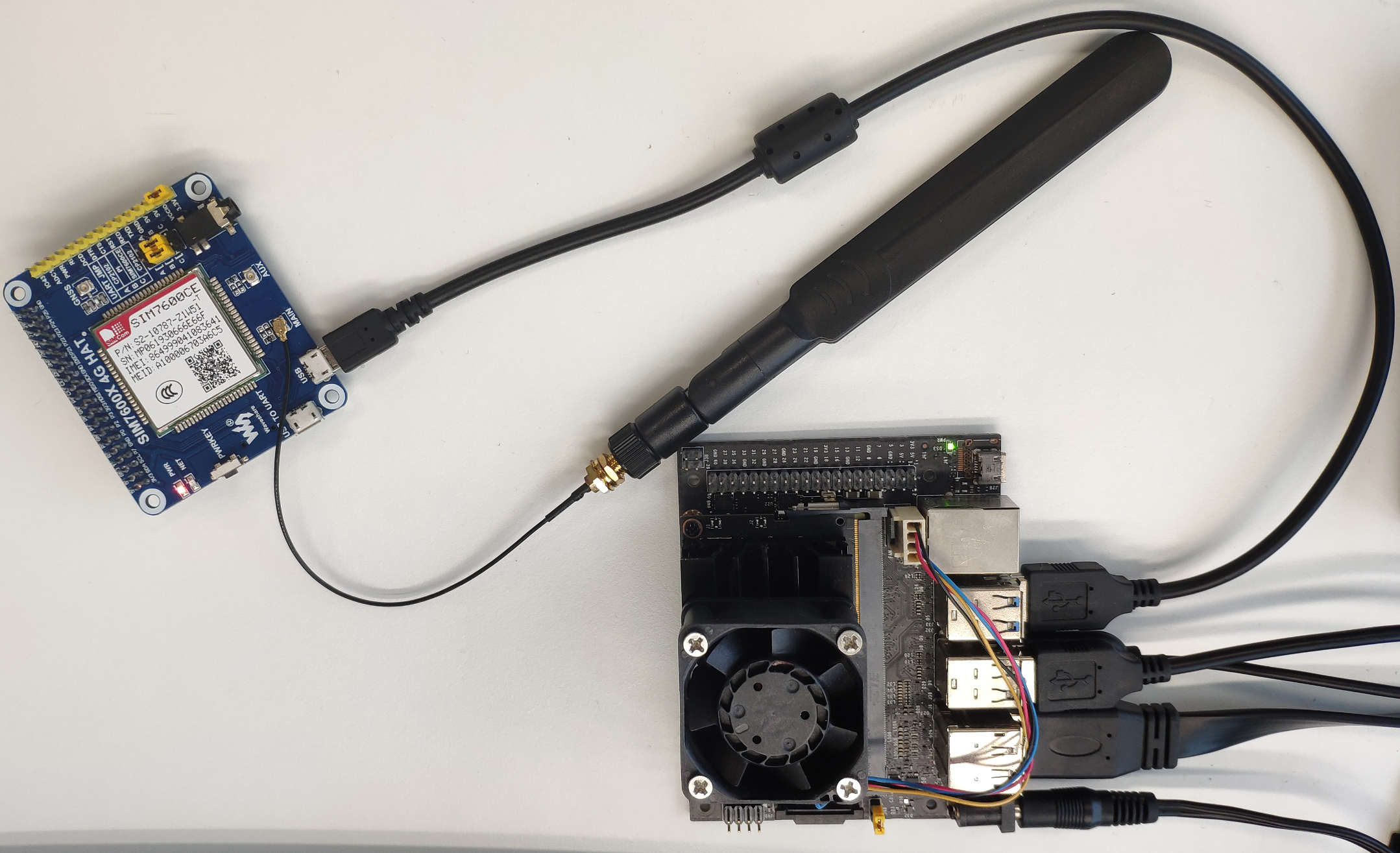
注意
1.若接到40Pin引脚上使用,则注意将SIM7600的Flight Mode,PWR引脚拉低,即需要设计初始化脚本,详情见相关产品页面,否则将进入飞行模式。
2.若树莓派通过USB线单独给SIM7600供电,则可能出现供电不稳定,导致SIM7600开机后关机的现象。
3.若仅仅使用拨号上网功能,则可以不接到Jetson Nano或Raspberry Pi的40Pin上。
4. 正式开始
4.1 检查硬件连接,网络连接
长按SIM7600CE 4G HAT上的PWKKEY键,使得SIM7600CE 4G HAT开机,正常开机后,NET灯应当闪烁(若未闪烁,请检查SIM卡是否可用,或是否进入了飞行模式)。
检查Jetson Nano的Ubuntu系统或树莓派的Raspbian系统是否内置了高通USB串口驱动,非新版本镜像系统可能未内置该驱动,查看方式如下图所示:
# 查看Ubuntu版本 uname -a lsb_release -a cat /proc/version # 查看是否有高通USB虚拟串口驱动 lsusb
如果能看到Qualcomm/Option字样,则说明内置了高通USB虚拟串口驱动输入AT指令,设置为4G上网,查看网络连接状态
# 关闭ModemManager进程,以防止minicom调试AT串口时,显示没用的数据 sudo su killall ModemManager # 安装minicom串口工具 apt-get install minicom # 查看串口设备,AT指令串口,为/dev/ttyUSB2 ls /dev/ttyUSB* # 用minicom打开串口 sudo minicom -D /dev/ttyUSB2 # 强制设置为4G上网 AT+CNMP=38 # 查询网络质量 AT+CSQ # 查询网络注册状 AT+CREG? # 查询网络运营商 AT+COPS? # 查询网络波段 AT+CPSI?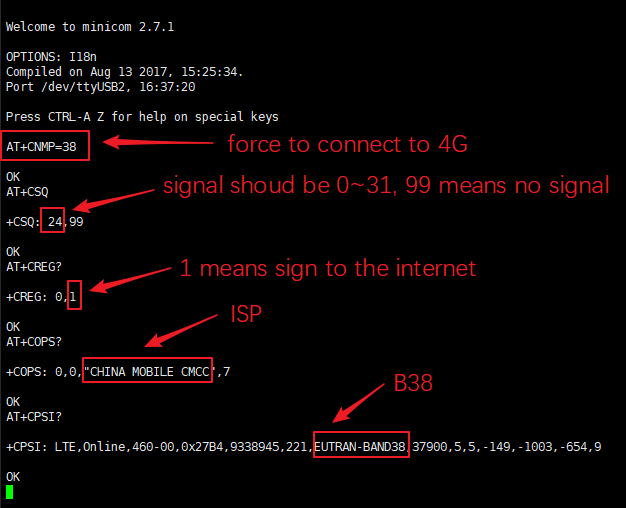
至此,SIM7600CE和Jetson Nano或Raspberry Pi硬件连接正常,网络连接正常。
4.2 编译并安装驱动模块文件
对于Jetson Nano的Ubuntu系统,默认没有simcom的用于wwan0网口的驱动模块文件,可用以下命令查看
lsmod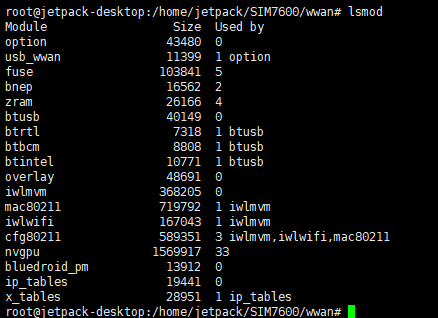
但是对于Raspberry Pi的Raspbian系统,默认是安装了高通的用于wwan0网口的驱动模块文件,如下图: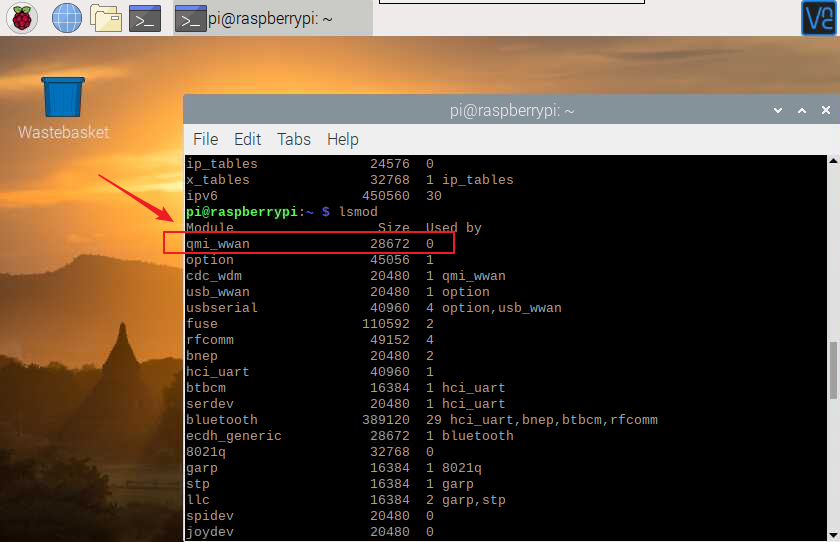
对于Raspberry Pi,需要先卸载该驱动,再安装上simcom的用于wwan0网口的驱动模块文件,卸载方式如下:
sudo su
rmmod qmi_wwan
在此基础上,执行后续步骤。
将编译以下驱动模块源程序:

该源程序及其Makefile将在文章末尾出给出
为了避免交叉编译的繁琐(交叉编译需要在虚拟机Ubuntu下编译Jetson Nano内核后,再编译驱动模块),可直接将以上两个文件保存到Jetson Nano文件系统中,再编译,注意该过程需要使用超级用户,如下图所示:
make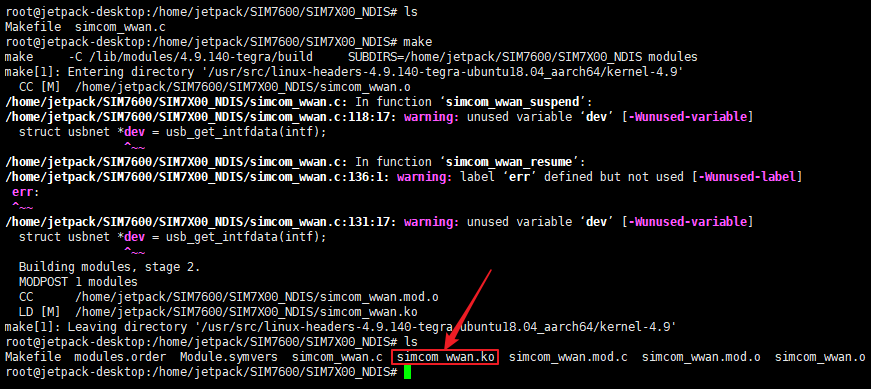
由上图可查看到,已编译成内核驱动模块文件。
接下来,将安装该驱动模块文件,注意需要使用超级用户:
insmod simcom_wwan.ko
lsmod
此时,simcom_wwan驱动模块已安装上。
可查看到内核的打印信息:
dmesg
Raspberry Pi编译及安装驱动模块的操作同Jetson Nano。
4.3 开始拨号,并分配IP
此时,可看到已经出现wwan0网口:
ifconfig -a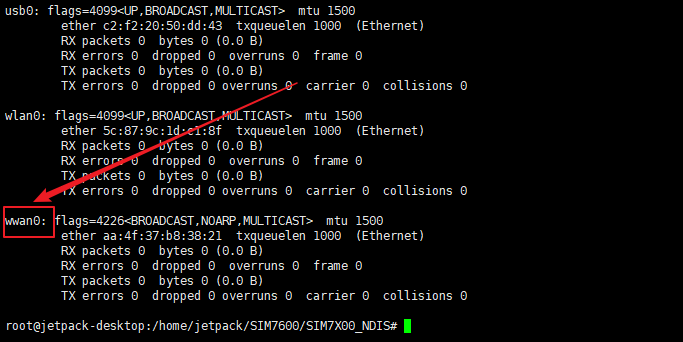
但是该网口并未分配IP地址,如需分配IP,需要
- 首先开启网口
ifconfig wwan0 up- 然后拨号
minicom -D /dev/ttyUSB2
AT$QCRMCALL=1,1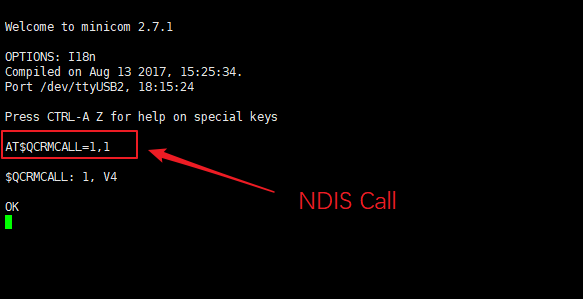
- 最后,分配IP
apt-get install udhcpc
udhcpc -i wwan0
此时,已经分配到IP,可对该网口进行测试:
ifconfig -a
ping -I wwan0 www.baidu.com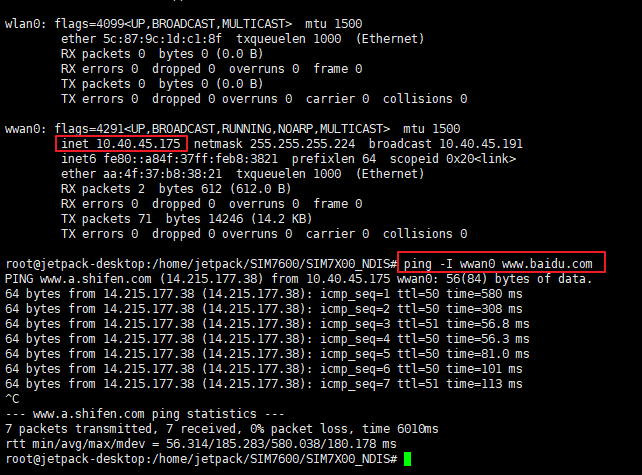
由上图可知,wwan0网口测试通过。
如果出现dns解析异常,输入以下命令可解决:
route add -net 0.0.0.0 wwan05 测速
最后,对采用NDIS拨号上网进行测速:
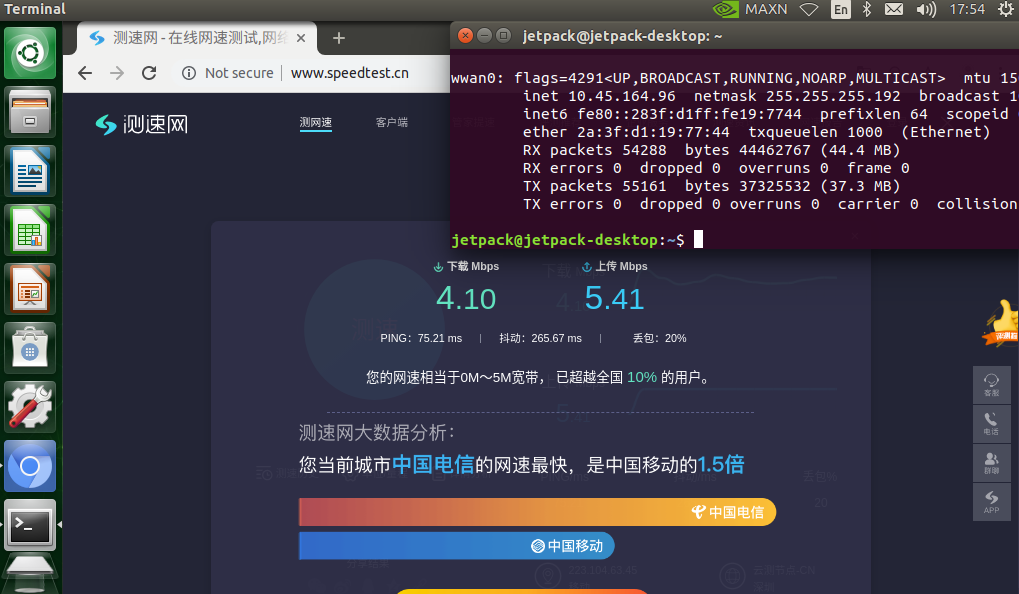
注意,以上数值仅供参考,不同地域,不同运营商,测速所得出的数据略有差距,在理想的情况下,在SIMCOM实验室测试,理想上行与下行速度为20Mbps。
6 驱动源码
simcom_wwan.c&Makefile:
/*
* Copyright (c) 2016 Xiaobin Wang <xiaobin.wang@sim.com>
*
* This program is free software; you can redistribute it and/or
* modify it under the terms of the GNU General Public License
* version 2 as published by the Free Software Foundation.
*/
/*
* history
* V1.00 - first release -20160822
*/
#include <linux/module.h>
#include <linux/netdevice.h>
#include <linux/ethtool.h>
#include <linux/etherdevice.h>
#include <linux/mii.h>
#include <linux/usb.h>
#include <linux/usb/cdc.h>
#include <linux/usb/usbnet.h>
/* very simplistic detection of IPv4 or IPv6 headers */
static bool possibly_iphdr(const char *data)
{
return (data[0] & 0xd0) == 0x40;
}
/* SIMCOM devices combine the "control" and "data" functions into a
* single interface with all three endpoints: interrupt + bulk in and
* out
*/
static int simcom_wwan_bind(struct usbnet *dev, struct usb_interface *intf)
{
int rv = -EINVAL;
//struct usb_driver *subdriver = NULL;
atomic_t *pmcount = (void *)&dev->data[1];
/* ignore any interface with additional descriptors */
if (intf->cur_altsetting->extralen)
goto err;
/* Some makes devices where the interface descriptors and endpoint
* configurations of two or more interfaces are identical, even
* though the functions are completely different. If set, then
* driver_info->data is a bitmap of acceptable interface numbers
* allowing us to bind to one such interface without binding to
* all of them
*/
if (dev->driver_info->data &&
!test_bit(intf->cur_altsetting->desc.bInterfaceNumber, &dev->driver_info->data)) {
dev_info(&intf->dev, "not on our whitelist - ignored");
rv = -ENODEV;
goto err;
}
atomic_set(pmcount, 0);
/* collect all three endpoints */
rv = usbnet_get_endpoints(dev, intf);
if (rv < 0)
goto err;
/* require interrupt endpoint for subdriver */
if (!dev->status) {
rv = -EINVAL;
goto err;
}
/* can't let usbnet use the interrupt endpoint */
dev->status = NULL;
printk("simcom usbnet bind here\n");
/*
* SIMCOM SIM7600 only support the RAW_IP mode, so the host net driver would
* remove the arp so the packets can transmit to the modem
*/
dev->net->flags |= IFF_NOARP;
/* make MAC addr easily distinguishable from an IP header */
if (possibly_iphdr(dev->net->dev_addr)) {
dev->net->dev_addr[0] |= 0x02; /* set local assignment bit */
dev->net->dev_addr[0] &= 0xbf; /* clear "IP" bit */
}
/*
* SIMCOM SIM7600 need set line state
*/
usb_control_msg(
interface_to_usbdev(intf),
usb_sndctrlpipe(interface_to_usbdev(intf), 0),
0x22, //USB_CDC_REQ_SET_CONTROL_LINE_STATE
0x21, //USB_DIR_OUT | USB_TYPE_CLASS| USB_RECIP_INTERFACE
1, //line state 1
intf->cur_altsetting->desc.bInterfaceNumber,
NULL,0,100);
err:
return rv;
}
static void simcom_wwan_unbind(struct usbnet *dev, struct usb_interface *intf)
{
struct usb_driver *subdriver = (void *)dev->data[0];
if (subdriver && subdriver->disconnect)
subdriver->disconnect(intf);
dev->data[0] = (unsigned long)NULL;
}
#ifdef CONFIG_PM
static int simcom_wwan_suspend(struct usb_interface *intf, pm_message_t message)
{
struct usbnet *dev = usb_get_intfdata(intf);
int ret;
ret = usbnet_suspend(intf, message);
if (ret < 0)
goto err;
err:
return ret;
}
static int simcom_wwan_resume(struct usb_interface *intf)
{
struct usbnet *dev = usb_get_intfdata(intf);
int ret = 0;
ret = usbnet_resume(intf);
err:
return ret;
}
#endif
struct sk_buff *simcom_wwan_tx_fixup(struct usbnet *dev, struct sk_buff *skb, gfp_t flags)
{
//skip ethernet header
if(skb_pull(skb, ETH_HLEN))
{
return skb;
}else
{
dev_err(&dev->intf->dev, "Packet Dropped\n");
}
if (skb != NULL)
dev_kfree_skb_any(skb);
return NULL;
}
static int simcom_wwan_rx_fixup(struct usbnet *dev, struct sk_buff *skb)
{
__be16 proto;
/* This check is no longer done by usbnet */
if (skb->len < dev->net->hard_header_len)
return 0;
switch (skb->data[0] & 0xf0) {
case 0x40:
printk("packetv4 coming ,,,\n");
proto = htons(ETH_P_IP);
break;
case 0x60:
printk("packetv6 coming ,,,\n");
proto = htons(ETH_P_IPV6);
break;
case 0x00:
printk("packet coming ,,,\n");
if (is_multicast_ether_addr(skb->data))
return 1;
/* possibly bogus destination - rewrite just in case */
skb_reset_mac_header(skb);
goto fix_dest;
default:
/* pass along other packets without modifications */
return 1;
}
if (skb_headroom(skb) < ETH_HLEN)
return 0;
skb_push(skb, ETH_HLEN);
skb_reset_mac_header(skb);
eth_hdr(skb)->h_proto = proto;
memset(eth_hdr(skb)->h_source, 0, ETH_ALEN);
fix_dest:
memcpy(eth_hdr(skb)->h_dest, dev->net->dev_addr, ETH_ALEN);
return 1;
}
static const struct driver_info simcom_wwan_usbnet_driver_info = {
.description = "SIMCOM wwan/QMI device",
.flags = FLAG_WWAN,
.bind = simcom_wwan_bind,
.unbind = simcom_wwan_unbind,
.rx_fixup = simcom_wwan_rx_fixup,
.tx_fixup = simcom_wwan_tx_fixup,
};
static const struct usb_device_id products[] = {
{USB_DEVICE(0x1e0e, 0x9025), .driver_info = (unsigned long)&simcom_wwan_usbnet_driver_info },
{USB_DEVICE(0x1e0e, 0x9001), .driver_info = (unsigned long)&simcom_wwan_usbnet_driver_info },
{ } /* END */
};
MODULE_DEVICE_TABLE(usb, products);
static struct usb_driver simcom_wwan_usb_driver = {
.name = "simcom_wwan",
.id_table = products,
.probe = usbnet_probe,
.disconnect = usbnet_disconnect,
#ifdef CONFIG_PM
.suspend = simcom_wwan_suspend,
.resume = simcom_wwan_resume,
.reset_resume = simcom_wwan_resume,
.supports_autosuspend = 1,
#endif
};
static int __init simcom_wwan_init(void)
{
return usb_register(&simcom_wwan_usb_driver);
}
module_init(simcom_wwan_init);
static void __exit simcom_wwan_exit(void)
{
usb_deregister(&simcom_wwan_usb_driver);
}
module_exit(simcom_wwan_exit);
MODULE_AUTHOR("Xiaobin Wang <xiaobin.wang@sim.com>");
MODULE_DESCRIPTION("SIM7600 RMNET WWAN driver");
MODULE_LICENSE("GPL");obj-m:=simcom_wwan.o
simcom_wwanmodule-objs:=module
KDIR:=/lib/modules/$(shell uname -r)/build
MAKE:=make
default:
$(MAKE) -C $(KDIR) SUBDIRS=$(PWD) modules
clean:
$(MAKE) -C $(KDIR) SUBDIRS=$(PWD) clean 


